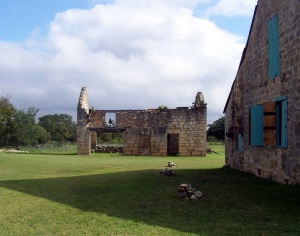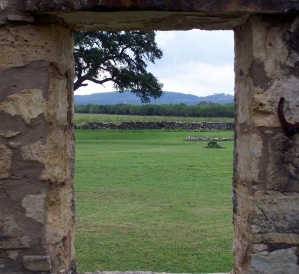 Having reason to head up to Fredericksburg last Saturday, we decided to explore doing it by the back roads; honestly, I would rather – unless in a tearing hurry – travel across Texas by the secondary roads. (Unless it is in the dark, or in the rain, and when the deer are especially depressed and suicidal.) We decided to travel north on the old Bulverde road, and stop and take pictures of anything interesting – and of course, one of the first things we pulled over to stop for was a very charming vista of a turn-of-the-last century cottage painted yellow with aqua-blue trim, surrounded by oak trees, a mown field of grass, and backed with a couple of stone buildings. The nearest stone building still had a roof – the farthest didn’t. I took some pictures from the roadside, and then my daughter noticed that there was a driveway, and a sign; obviously the place was some kind of enterprise more or less open to the public. We’re the public … so we pulled in. From the circular parking lot we could see the screened porch on the back of the cottage, and a round table and four chairs under the huge ancient oak tree at the back – and in a moment the owner came out to join us. Essentially, we had a tour of the old buildings; it’s what remains of the old Pieper farmstead, which was established round and about 1850. (It’s now an event venue, and the cottage is a bed and breakfast.)
Having reason to head up to Fredericksburg last Saturday, we decided to explore doing it by the back roads; honestly, I would rather – unless in a tearing hurry – travel across Texas by the secondary roads. (Unless it is in the dark, or in the rain, and when the deer are especially depressed and suicidal.) We decided to travel north on the old Bulverde road, and stop and take pictures of anything interesting – and of course, one of the first things we pulled over to stop for was a very charming vista of a turn-of-the-last century cottage painted yellow with aqua-blue trim, surrounded by oak trees, a mown field of grass, and backed with a couple of stone buildings. The nearest stone building still had a roof – the farthest didn’t. I took some pictures from the roadside, and then my daughter noticed that there was a driveway, and a sign; obviously the place was some kind of enterprise more or less open to the public. We’re the public … so we pulled in. From the circular parking lot we could see the screened porch on the back of the cottage, and a round table and four chairs under the huge ancient oak tree at the back – and in a moment the owner came out to join us. Essentially, we had a tour of the old buildings; it’s what remains of the old Pieper farmstead, which was established round and about 1850. (It’s now an event venue, and the cottage is a bed and breakfast.)
Anton Pieper apparently was one of the Adelsverein settlers, who married a fellow settler who had been widowed during the Atlantic crossing, or very shortly after arriving in Texas. Together they had eight children, and the old stone house that was one of the first houses built in present-day Bulverde, was also the biggest, and housed the entire family. Pieper had a deep well dug, which is still providing water. By the time the present owner purchased the property from a Pieper descendent, the roof of the stone barn had fallen in, and the old house was used for storage. At present it is being renovated, bit by bit; the floors restored, wood-work repaired and replaced, with an eye toward being used for events, just as the barn and the cottage are. 
The house had some similarities to the house that I created for the fictional Beckers; built of stone, with wooden shutters instead of glass in the windows, and a generous cellar. There are some differences; a simpler layout; a single large room, with another on the second floor, and a smaller ground floor room to either side of the main room, with the single upstairs room accessed by an exterior staircase. The cellar is being used as a wine cellar, now. The floorboards to the upstairs room disintegrated, and have been taken away, so the main room has a tall ceiling, crossed only by the large beams which once supported them. The staircase is gone, too. What was the kitchen is still being worked on – and the floor is just decomposed granite gravel. The owner has designs on making it authentically 1850 – with either a fireplace hearth, or maybe an iron cookstove. (Either would have been authentic.) I expounded on how there would have been copper pots and pans, and bunches of dried herbs hanging from the stone mantel-piece and the ceiling beams. In either case, I would love to have a house like this for my own.
The barn walls exist pretty much as always; there are two huge beams over the wide openings on either side, sixteen inches square at least, and notched to accommodate the beams that would have supported the loft overhead. There was a shed attached to one end of the barn, which still has a roof, and the original – if slightly warped floor-boards. That room is also being renovated; it might have been the hired hand’s quarters.
It was a fantastically interesting tour – and we exchanged cards and promised to keep in touch; the place is a work in progress, and I am interested in it, and knowledgeable about the general history involved. I’ve added a link to the website – it’s called The Settlement.

Recent Comments